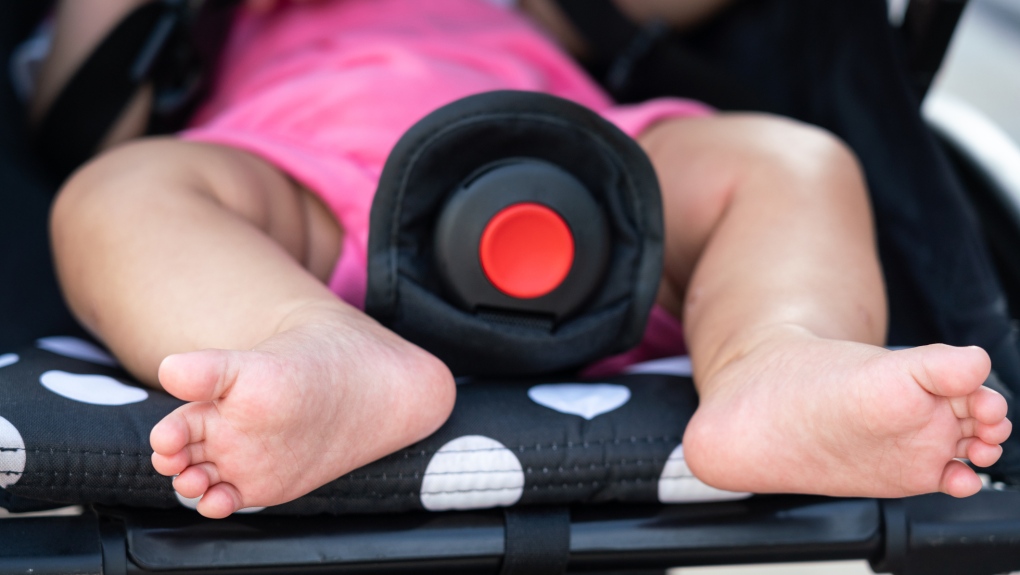'Disturbing': Alleged drunk driver found passed out with baby in Nanaimo
 A child is pictured in a car seat. (iStock)
A child is pictured in a car seat. (iStock)
Mounties in Nanaimo, B.C., say a woman was found passed out at the wheel of a parked truck while her baby and dog were in the backseat last week.
The Nanaimo RCMP say they were notified by Oceanside RCMP that a Ford F-150 truck was reportedly involved in a hit-and-run crash on Nov. 17.
Later that day, around 10:30 a.m., police found a vehicle that matched that description parked at the Nanaimo North Town Centre.
When officers went to check the vehicle, they found the woman passed out in the driver's seat with her infant strapped into a baby seat inside the truck, as well as a dog.
The vehicle was in park but the engine was still running, Mounties said.
The officers tried to wake the woman by yelling at her and knocking on the windows. However, they were unable to rouse the woman so they called paramedics and firefighters to help access the vehicle.
The 35-year-old driver was eventually woken up and exited the vehicle.
The mother and child were brought to hospital by paramedics out of an abundance of caution, at which point police say they could smell alcohol coming from the woman's breath.
The pair were examined at the hospital and the child was medically cleared and turned over to its father.
Meanwhile, the mother was taken to the Nanaimo RCMP detachment where two breath samples were taken which registered blood alcohol levels that were more than double the legal limit, police claim.
The woman was issued a 90-day driving ban, her vehicle was impounded for one day, and she was charged with impaired driving and driving while over the legal limit of .08, police say.
"This incident is disturbing on many levels but needless to say we are just glad that the child was not injured in any way," said Reserve Const. Gary O’Brien of the Nanaimo RCMP in a release Thursday.
None of the charges have been tested in court.
CTVNews.ca Top Stories

How quietly promised law changes in the 2024 federal budget could impact your day-to-day life
The 2024 federal budget released last week includes numerous big spending promises that have garnered headlines. But, tucked into the 416-page document are also series of smaller items, such as promising to amend the law regarding infant formula and to force banks to label government rebates, that you may have missed.
Which foods have the most plastics? You may be surprised
'How much plastic will you have for dinner, sir? And you, ma'am?' While that may seem like a line from a satirical skit on Saturday Night Live, research is showing it's much too close to reality.
opinion I've been a criminal attorney for decades. Here's what I think about the case against Trump
Joey Jackson, a criminal defence attorney and a legal analyst for CNN, outlines what he thinks about the criminal case against Donald Trump in the 'hush money trial.'
$3.8M home in B.C.'s Okanagan has steel shell for extra wildfire protection
A home in B.C.'s Okanagan that features a weathering steel shell designed to provide some protection against wildfires has been listed for sale at $3.8 million.
Diver pinned under water by an alligator figured he had choice. Lose his arm or lose his life
An alligator attacked a diver on April 15 as he surfaced from his dive, nearly out of air. His tank emptied with the gator's jaws crushing the arm he put up in defence.
Psychologist becomes first person in Peru to die by euthanasia after fighting in court for years
A Peruvian psychologist who suffered from an incurable disease that weakened her muscles and had her confined to her bed for several years, died by euthanasia, her lawyer said Monday, becoming the first person in the country to obtain the right to die with medical assistance.
Mystery surrounds giant custom Canucks jerseys worn by Lions Gate Bridge statues
The giant stone statues guarding the Lions Gate Bridge have been dressed in custom Vancouver Canucks jerseys as the NHL playoffs get underway.
Celebrity designer sentenced to 18 months in prison for smuggling crocodile handbags
A leading fashion designer whose accessories were used by celebrities from Britney Spears to the cast of the 'Sex and the City' TV series was sentenced Monday to 18 months in prison after pleading guilty in Miami federal court on charges of smuggling crocodile handbags from her native Colombia.
Wildfire leads to evacuation order issued for northeast Alberta community
An evacuation order was issued on Monday afternoon for homes in the area of Cold Lake First Nation.































